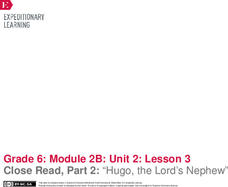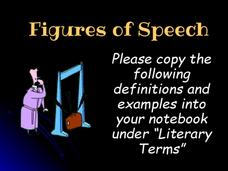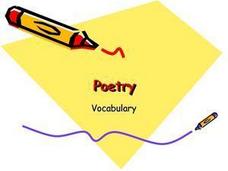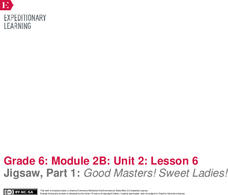Texas Education Agency (TEA)
Simile and Metaphor (English III Reading)
The key idea in this interactive exercise designed for high schoolers is that figurative language, especially similes, and metaphors, add layers of meaning to a text. Users examine examples from speeches, ads, movie dialogue, and poems,...
Novelinks
Tuck Everlasting: Similes, Metaphors, and Personification in Imagery
Poetic language is abundant in Natalie Babbitt's beautiful novel, Tuck Everlasting. Learners note the examples of similes, metaphors, and personification they find as they read, and illustrate how the language creates a sensory...
K12 Reader
Warm Up to Alliteration!
How can you tell if a sentence has alliteration? Use a short worksheet to help kids identify examples of alliteration, complete sentences to create alliteration, and use nouns to write their own alliterative sentences.
K12 Reader
Alliteration Animals
Bees buzz, dogs dig, lion laze, and snakes slither! Use alliteration to create sentences about four different animals.
EngageNY
Grade 10 ELA Module 4: Unit 2, Lesson 5
When Macbeth says, "Nature seems dead," he uses personification. Using the resource, scholars complete a Quick Write to analyze the impact of figurative language on the mood of Shakespeare's Macbeth. Pupils also participate in an...
EngageNY
Grade 11 ELA Module 2: Unit 1, Lesson 16
Take a second look. Scholars examine the chapter "Of Our Spiritual Strivings" as a whole and once again work in groups to discuss Du Bois's use of figurative language. They also complete the Mid-Unit Assessment Evidence Collection Tool...
EngageNY
Grade 11 ELA Module 1: Unit 2, Lesson 8
How does Shakespeare employ figurative language to emphasize central ideas in Hamlet? Using an interesting resource, learners complete a Quick Write to answer the question. Additionally, they continue their study of the play by exploring...
School District No. 71
Adding Written Detail: Using Jane Yolen’s Owl Moon as a Mentor Text
Access your senses with a worksheet on sensory language. Based on Owl Moon by Jane Yolen, the worksheet prompts kids to find examples of each of the five senses, as well as phrases for inner emotion.
Curated OER
Figurative Language Scavenger Hunt
Eighth graders analyze and interpret figurative language. They listen to some examples of poetry which use figurative language. Then, they divide into groups and attempt to find more examples. Finally, 8th graders write what the poet is...
EngageNY
Close Read, Part 2: “Hugo, the Lord’s Nephew”
No, not literally. Scholars read Hugo, the Lord’s Nephew to compare figurative and literal language. Readers learn about simile, metaphor, personification, and idioms with a graphic organizer. Pupils then answer text-dependent questions...
Curated OER
The Language of Surprise
Aspiring writers complete and discuss fill-in-the-blank cliché expressions, define cliché as a form of predictable writing, take cliché expressions and turn them into new, unpredictable ones, read poetry that illustrates writer's use of...
Scholastic
Quick as a Cricket Lesson Plan
Teaching young learners about similes is easy as pie with this primary grade language arts instructional activity. Following a class reading of the children's book, Quick as a Cricket by Audrey Wood, young readers learn the definition of...
Poetry4kids
How to Write an Exaggeration Poem
The best poetry writing lesson of all time is here for you! Learn all about the art of exaggeration with a lesson on exaggeration poems, which instructs students to use wild imagery to convey their message.
Curated OER
Teaching Debate to ESL Students
Language learners use the debate format to practice formulating, expressing, and defending their ideas. Working in teams, class members develop resolutions, use opinion indicators to express their opinions and reasons, and prepare...
Curated OER
Figurative Language 2
Students read nursery rhymes and advertisements to identify examples of figurative language. As a class, students discuss the use of figurative language and its effectiveness in advertising, children's books, rhymes, poetry, etc. ...
Curated OER
Figures of Speech
Give your learners quick definitions of simile, metaphor, and analogy. As the first slide in this PowerPoint suggests, you can use the presentation as a warm-up and have scholars record the words and their meanings in a Literary Terms...
Curated OER
Academic Vocabulary
Arm your writers with an arsenal of literary terms. With definitions of everything from plot structure and figurative language to point-of-view and types of irony, learners will gain an understanding of elements in stories and be able to...
Curated OER
What is Language?
Intended to be used along with the first chapter of An Introduction to Language textbook, this PowerPoint is full of linguistic terminology that is not necessarily explained. This tool can be used to complement a lecture or a text, but...
K12 Reader
Metaphors Compare Things
This worksheet on metaphors is your ticket to better writing! As learners read ten sentences, they underline the metaphor and circle the two objects of comparison.
Curated OER
Poetry Vocabulary
Consisting of a thorough and straightforward list of poetry terminology, the first part of this presentation would be a good introduction to a poetry unit, or a review for an upcoming poetry project. The list of terms is quite extensive,...
Curated OER
Metaphors
Metaphors open doors to descriptive language for your poets. They read the poem "What is the Sun" and record all the metaphors they find. Then, scholars change one of them to a simile. After answering two more comprehension questions,...
Reed Novel Studies
The Great Gatsby: Novel Study
Some people believe that no matter how hard a man works, the American dream will always remain out of reach. A study guide for The Great Gatsby explores the themes, such as the illusory American dream, and elements of F. Scott...
Curated OER
Similes
Similes are a great way to get your writers thinking about descriptive details. They read a brief explanation which covers clichés and the general wording of a simile. Then, learners try a few on their own. First, they complete nine...
EngageNY
Jigsaw, Part 1: Good Masters! Sweet Ladies!
Complete a puzzle one piece at a time. Scholars gather in triads to complete jigsaw activities over a monologue from Good Masters! Sweet Ladies. They read as a group and independently and use sticky notes to identify the gist of each...

























